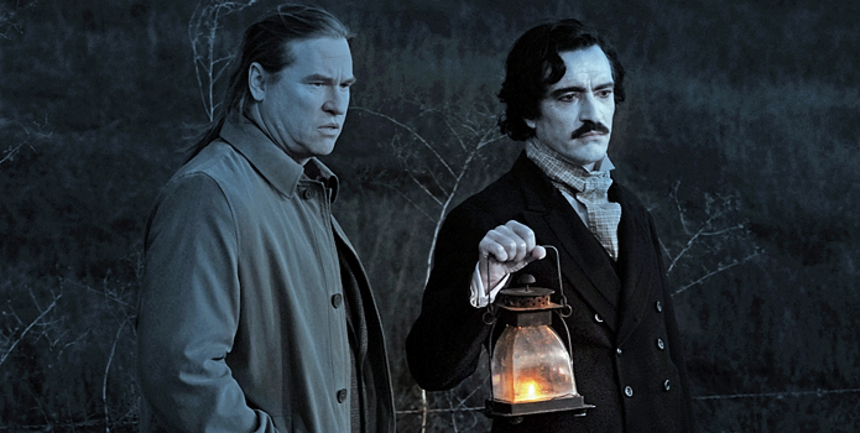TIFF 2011: TWIXT Review

The plot, seeming to occupy the same wavelength of Season 2 of Twin Peaks by way of Woody Allen's Midnight in Paris (yes!), concerns Kilmer's aforementioned despondent writer Hall Baltimore becoming embroiled in a murder mystery in Swann Valley after the town Sheriff convinces him to write a book with him about the killings. True to the genre, Swann Valley is one of those "aint-what-it-appears-to-be" kind of towns. Tom Waits deliciously describes the community in the film's opening narration as a host to something "evil", emphasizing the a bell-tower with seven faces, none of which tell the accurate time. Baltimore quickly becomes privy to the supernatural forces of Swann Valley on his first night when he discovers on the first stroke of midnight that the town transforms into an ethereal dreamscape populated by restless souls, including to Baltimore's delighted surprise, the soul of his favorite writer Edgar Allan Poe. Conferring nightly with Poe and a mysterious vampiric young goth (Elle Fanning), Baltimore begins to work out his writing block, unravel the town's conspiracy and eventually confront his own guilt for his daughter's death.
Inspired by a drunken unresolved dream Coppola claims he had in Istanbul, and clearly invoking Coppola's own grief for his son's death (who died under circumstances similar to Baltimore's daughter), the film's autobiographical cues are not hard to miss, and neither is the fun Coppola is having with the generic conceits of small-town murder mysteries and supernatural shenanigans, loading the proceedings with amusing quicks and eclecticism. The sheriff obsesses over the distinction between bat and bird houses, the deputy's best friend is a 8 year old who conducts Ouija board seances, a local gang of goths (who may actually be vampires) are lead by pouty Twilight-lite kid named Flamingo... Your mileage may vary, but I found all of these details so refreshingly off the cuff, and in the pursuit of such pure fun that it became infectious. But most importantly there is also real pathos at play beneath these antics and if you've joined the film's wavelength, you'll find yourself moved when Baltimore reaches his predictable, yet honest and emotional climax.
Coppola has grand plans for the exhibition of this film, intending to tour it with a live orchestra and to edit the film live, so that each screening will subtly adjust in a manner akin to live theatre. This radical concept wasn't demonstrated during the TIFF screening, but I am definitely excited to how this will work. There are several discontinuous moments in the film, especially during Baltimore's conversations with Poe that seem ripe for shuffling around on the fly. That the film's plot never feels entirely resolved also leads me to wonder how much of the film we have actually seen, what other threads Coppola is waiting to pull out.
So there you have it, the musings of a TWIXT apologist. Awkward line-readings, erratic plotting, and wonky-CGI be damned, Coppola is bringing the crazy, and with such an undeniable grinning confidence. This may be a film where the viewer is asked to put 3D glasses on for two arbitrary action sequences, both cued by a CG 3D glasses graphic that spirals onto the camera lens and both bizarrely not occurring in the dream world sequences! A film that attempts to make Skype conversations compelling and where braces become deadly projectiles! A film that concludes with such punch-line abruptness, I strained to listen for a "Wah Wah!" cue! But its also the kind of film where you just end up listing its moments with mounting incredulity when asked what you thought of it. I like that kind of film.

Do you feel this content is inappropriate or infringes upon your rights? Click here to report it, or see our DMCA policy.






